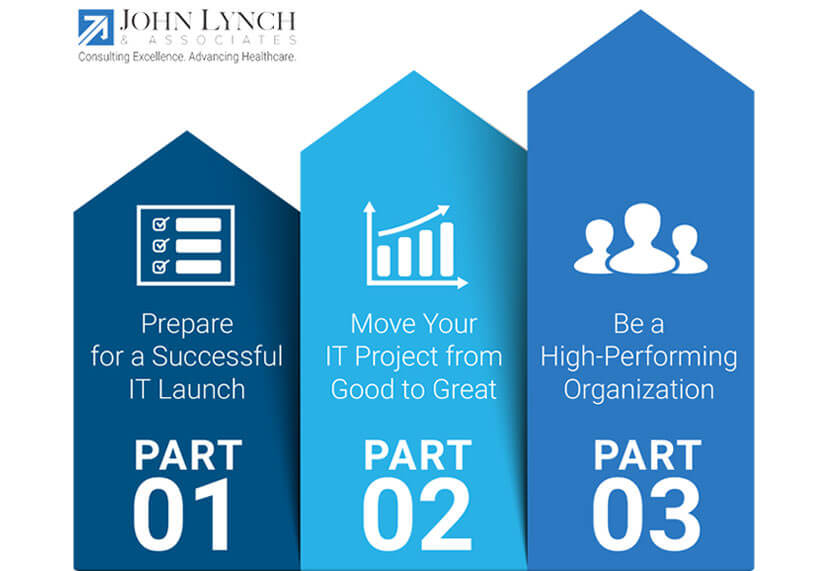
When Everything is on Fire: Part 3 – How High-Performing Organizations Approach a Healthcare IT Project
March 26, 2019If you have been following parts 1 and 2 of our 3-part series on healthcare IT project implementation, you might be feeling a bit overwhelmed at this point. Frankly, taking on the responsibility of shifting the mindset of your leadership team, then creating new systems for measuring success, planning, and communication is no easy feat.
Yet, the end goal is beyond worthy of the hard work you have put in.
Why did you enter the field of healthcare? Whether you are an administrator, a medical assistant, a physician, or an executive, you entered this challenging industry to help others.
After spending years working with healthcare organizations, medical professionals, and talented administrative personnel, I have come to understand one unwavering thing: healthcare professionals are high-achievers.
It takes a special person to dedicate his or her life to serving and caring for others. Furthermore, I have never met a healthcare professional who was satisfied with the status quo.
Ultimately, we all want to become higher-performing versions of ourselves. At John Lynch & Associates, that is a mission we get behind every single day. We help each of our clients become high-performing organizations.
To achieve that aspirational goal, you need to have a dedicated team, stick to a schedule, prioritize reporting, and maximize your experience to advance healthcare. With organization and commitment, you will be able to add incredible value and make a meaningful impact on the patients you serve.
Find the Right Healthcare IT Project Manager
A project manager serves as your compass throughout the duration of your healthcare IT project. Once the work begins, it is critical to track the work being done and ensure the cost is being contained.
Small tasks allow us to complete small projects. Small projects allow us to complete bigger projects. And bigger projects allow us to have a successful healthcare IT project implementation.
An expert project manager is able to keep everyone on task and contribute to the larger goal. The more “Type A,” the better!
Stick to a Schedule
Your project manager will begin by outlining your execution plan. The plan should be defined, rigid, and formulaic, while providing the flexibility for your team to always be striving for a better result. Doing so ensures that as an organization you are able to improve on mistakes and duplicate successes.
Whether your project is small enough to be handled by one project manager or you have a team of four to five managers working together, there should be a consistent system of biweekly reporting to ensure that enough progress is being made between reports to build momentum and emotional buy-in from the team, while being frequent enough to allow for course corrections as needed.
The reporting schedule is vital for risk mitigation and preventing legal issues, as well. The sooner an issue is identified, the smaller the problem will be to handle.
Closing & Control Strategies
Finally, the project will come to a close. During this time, you will need to measure your key performance indicators (KPIs) in the context of the baselines that were established at the start of the project.
Control for future risks by identifying the strengths, weaknesses, and accurate timelines of the recent project so that the next time your organization needs to execute a similar plan – even if it is ten or fifteen years down the road – you will be better equipped to do so.
Additionally, you can reinforce the strength of your organizational systems by implementing control strategies. For example, set a recurring appointment with your team to evaluate your operations in order to identify any areas that need to be reinforced. Then, implement training for new skills, re-train employees on existing work requirements, and consistently evaluate workflows, which naturally evolve over time.
Experiential Growth
Ultimately, as high-achievers healthcare professionals strive to help others become better versions of themselves. As leaders in the healthcare industry, it is our duty to help our employees be better than they were yesterday.
To do so, we need to identify the visionaries who want to aim high and carry the organization to new heights of success and we need to identify the integrators who are happy to do the boots-on-the-ground work to make the big picture vision come true for the benefit of the organization at large.
A project is not just a project; and work is not just work. In the healthcare industry, every move we make has the power to dramatically impact patient lives. We owe it to our patients and our community at large to do our very best work.
At John Lynch & Associates, we are passionate about helping each of our clients become a higher performing organizations. It is not an overnight process, but it is a deeply rewarding one.
As your healthcare IT project comes to a close, reflect back on the experience. With reflection comes growth; with growth comes progress; with our collective progress, we are able to advance healthcare together.
If you have questions about how to best approach your upcoming healthcare IT project, let us know. We would be honored to help you and your team commit to excellence and create a roadmap to success.
